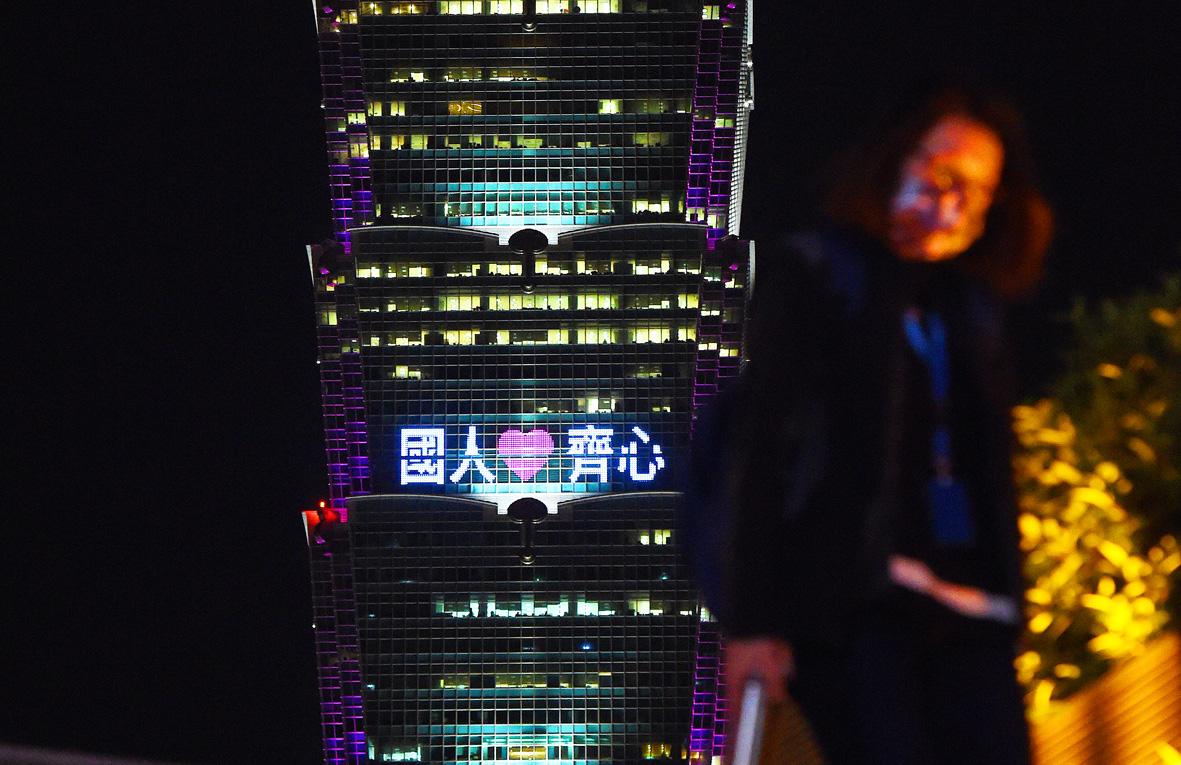Taiwan Ratings Corp (中華信評) has downgraded the credit outlook for Taipei Financial Center Corp (台北金融大樓) from “stable” to “negative,” as the operator of the Taipei 101 skyscraper has seen a slump in tourists and shoppers.
The local arm of S&P Global Ratings said the negative outlook reflects the likely deterioration in the company’s credit profile this year and uncertainty over a recovery.
A dire lack of foreign tourists would diminish revenue from its observatory and tourist spending at its shopping mall, the agency said.

Photo: Liao Chen-huei, Taipei Times
The number of foreign visitors dropped close to zero over the past few weeks due to border controls and flight bans to curb the spread of COVID-19.
“We expect international travel to remain muted for six more months, as the number of infections is still on the rise worldwide,” Taiwan Ratings said, expecting a modest recovery toward the end of the year.
That might affect the number of visitors to the observatory and the observation deck’s revenue this year by up to 80 percent, it said.
Local customers have also reduced shopping frequency to avoid infections, it added.
Retail sales at the Taipei 101 shopping center are forecast to drop by 31 to 35 percent given the store’s collection of luxury and fashion brands for which consumption is discretionary in nature, it said.
The office building’s rental income would not be affected by the pandemic, because rental rates are fixed and long-term in nature, it said.
In addition, the Taipei 101 building has built up a strong tenant portfolio, mostly high-profile global firms and large domestic companies that can afford above-average rents, it said.
However, office rent accounts for only 26 percent of overall operating income and would not be sufficient to compensate for the slowdown in other segments, it said.
This story has been modified since it was first published to avoid any inconvenience caused to Taipei Financial Center Corp.

In Italy’s storied gold-making hubs, jewelers are reworking their designs to trim gold content as they race to blunt the effect of record prices and appeal to shoppers watching their budgets. Gold prices hit a record high on Thursday, surging near US$5,600 an ounce, more than double a year ago as geopolitical concerns and jitters over trade pushed investors toward the safe-haven asset. The rally is putting undue pressure on small artisans as they face mounting demands from customers, including international brands, to produce cheaper items, from signature pieces to wedding rings, according to interviews with four independent jewelers in Italy’s main

Japanese Prime Minister Sanae Takaichi has talked up the benefits of a weaker yen in a campaign speech, adopting a tone at odds with her finance ministry, which has refused to rule out any options to counter excessive foreign exchange volatility. Takaichi later softened her stance, saying she did not have a preference for the yen’s direction. “People say the weak yen is bad right now, but for export industries, it’s a major opportunity,” Takaichi said on Saturday at a rally for Liberal Democratic Party candidate Daishiro Yamagiwa in Kanagawa Prefecture ahead of a snap election on Sunday. “Whether it’s selling food or

CONCERNS: Tech companies investing in AI businesses that purchase their products have raised questions among investors that they are artificially propping up demand Nvidia Corp chief executive officer Jensen Huang (黃仁勳) on Saturday said that the company would be participating in OpenAI’s latest funding round, describing it as potentially “the largest investment we’ve ever made.” “We will invest a great deal of money,” Huang told reporters while visiting Taipei. “I believe in OpenAI. The work that they do is incredible. They’re one of the most consequential companies of our time.” Huang did not say exactly how much Nvidia might contribute, but described the investment as “huge.” “Let Sam announce how much he’s going to raise — it’s for him to decide,” Huang said, referring to OpenAI

The global server market is expected to grow 12.8 percent annually this year, with artificial intelligence (AI) servers projected to account for 16.5 percent, driven by continued investment in AI infrastructure by major cloud service providers (CSPs), market researcher TrendForce Corp (集邦科技) said yesterday. Global AI server shipments this year are expected to increase 28 percent year-on-year to more than 2.7 million units, driven by sustained demand from CSPs and government sovereign cloud projects, TrendForce analyst Frank Kung (龔明德) told the Taipei Times. Demand for GPU-based AI servers, including Nvidia Corp’s GB and Vera Rubin rack systems, is expected to remain high,